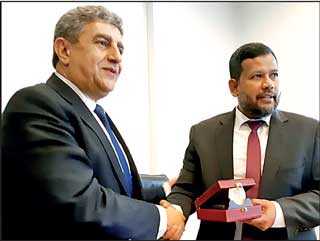Monday Feb 23, 2026
Monday Feb 23, 2026
Tuesday, 29 October 2019 00:00 - - {{hitsCtrl.values.hits}}

Security has become the key issue in Sri Lanka in the aftermath of Easter Sunday bombings, but if other pressing problems are ignored in lieu of security, they would themselves escalate into security
 |
Doha Institute of Graduate Studies Centre for Conflict and Humanitarian Studies Director Sultan Barakat (left) meets Sri Lankan Minister of Industry, Commerce, Resettlement of Protracted Displaced Persons, Cooperative Development, Skills Development, and Vocational Training Rishad Bathiudeen on 26 October at the Ministry, Colombo 3
|
threats, warned a visiting conflict expert and Brookings Institution Fellow from Qatar on 26 October in Colombo.
“The Easter Sunday bombings really delayed progress in many aspects of Sri Lanka. If other pressing issues of communities are not addressed, they can escalate into security threats in future” warned Doha Institute of Graduate Studies Centre for Conflict and Humanitarian Studies Director Sultan Barakat on 26 October. Leading an 11-country student delegation from his Centre, Brookings Institution Senior Fellow Director Barakat met Sri Lanka’s Minister of Industry, Commerce, Resettlement of Protracted Displaced Persons, Cooperative Development, Skills Development, and Vocational Training (ICTPDPCDSDVT) Rishad Bathiudeen on 26 October at the Ministry, Colombo 3.
The visiting student delegation met Minister Bathiudeen at the end of their ten-day Sri Lanka field tour, during which they spoke to local conflict and resettlement experts, and visited the Northern areas and met individuals who lived through the conflict. Director Barakat was also a prominent personality in Doha’s two-day peace talks (concluded early July 2019) to end the Afghanistan war. The Doha talks were sponsored by Qatar and Germany.
“By definition, this student delegation is from Muslim countries. But in this academic exercise, we are not only interested in problems of Muslims in Sri Lanka, but also interested in a wide range of issues faced by all communities here – the displacement of Tamil communities, their return, the economic reconstruction opportunities, the FDI investments coming to Sri Lanka etc. – we are interested in the whole, comprehensive picture in this academic exercise. We come here to learn from the Sri Lankan experience of dealing with a conflict and Internally Displaced Students (IDPs). We see that Sri Lanka has lots of experience in reconstruction and reconciliation since 2009. We can learn from this experience and also give our inputs to Sri Lanka. We’d like to think that just visiting those IDP communities here will give the IDPs the energy for resettlement and reconciliation,” said Director Barakat.
He warned: “We feel that the Easter Sunday bombings really delayed progress in many aspects of Sri Lanka including in displaced persons’ return to lands and resettlement, since everybody is now concerned about security first. ‘Security first’ may not be the best approach because there are other, more pressing needs of local communities and if they are not addressed, they can escalate into security threats in future.”
Minister Bathiudeen welcomed Director Barakat’s comments and listened to the Sri Lankan experiences of the visiting students. “Thanks to speedy action by the Sri Lankan Government, people, and security forces, the suspects of Easter Sunday bombings were apprehended immediately. In fact, the role of our Muslim community in assisting the security forces to identify remaining extremists was commendable, and helped in ending the local tensions that could have been devastating to us if it was not controlled in that way. I too realise that ignoring pressing issues of communities can lead to later conflicts. Therefore as the Sri Lankan Minister for Resettlement of Protracted IDPs, I have instituted a Resettlement Task Force under my Ministry to look into protracted IDP issues in the country and we have made progress since we commenced work through this Task Force.”